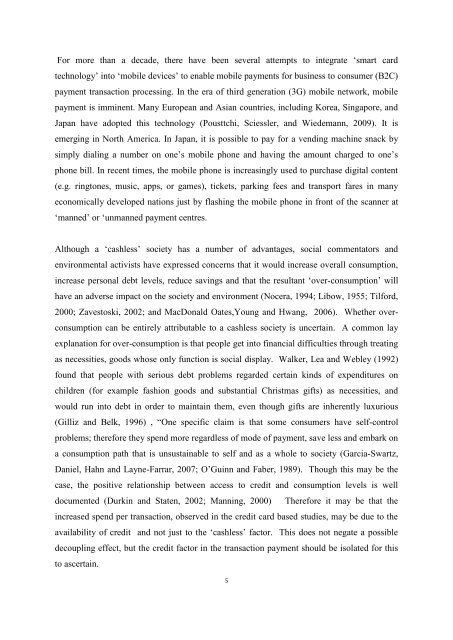Cash or Card: Consumer Perceptions of Payment Modes - Scholarly ...
Cash or Card: Consumer Perceptions of Payment Modes - Scholarly ...
Cash or Card: Consumer Perceptions of Payment Modes - Scholarly ...
You also want an ePaper? Increase the reach of your titles
YUMPU automatically turns print PDFs into web optimized ePapers that Google loves.
F<strong>or</strong> m<strong>or</strong>e than a decade, there have been several attempts to integrate ‘smart card<br />
technology’ into ‘mobile devices’ to enable mobile payments f<strong>or</strong> business to consumer (B2C)<br />
payment transaction processing. In the era <strong>of</strong> third generation (3G) mobile netw<strong>or</strong>k, mobile<br />
payment is imminent. Many European and Asian countries, including K<strong>or</strong>ea, Singap<strong>or</strong>e, and<br />
Japan have adopted this technology (Pousttchi, Sciessler, and Wiedemann, 2009). It is<br />
emerging in N<strong>or</strong>th America. In Japan, it is possible to pay f<strong>or</strong> a vending machine snack by<br />
simply dialing a number on one’s mobile phone and having the amount charged to one’s<br />
phone bill. In recent times, the mobile phone is increasingly used to purchase digital content<br />
(e.g. ringtones, music, apps, <strong>or</strong> games), tickets, parking fees and transp<strong>or</strong>t fares in many<br />
economically developed nations just by flashing the mobile phone in front <strong>of</strong> the scanner at<br />
‘manned’ <strong>or</strong> ‘unmanned payment centres.<br />
Although a ‘cashless’ society has a number <strong>of</strong> advantages, social commentat<strong>or</strong>s and<br />
environmental activists have expressed concerns that it would increase overall consumption,<br />
increase personal debt levels, reduce savings and that the resultant ‘over-consumption’ will<br />
have an adverse impact on the society and environment (Nocera, 1994; Libow, 1955; Tilf<strong>or</strong>d,<br />
2000; Zavestoski, 2002; and MacDonald Oates,Young and Hwang, 2006). Whether over-<br />
consumption can be entirely attributable to a cashless society is uncertain. A common lay<br />
explanation f<strong>or</strong> over-consumption is that people get into financial difficulties through treating<br />
as necessities, goods whose only function is social display. Walker, Lea and Webley (1992)<br />
found that people with serious debt problems regarded certain kinds <strong>of</strong> expenditures on<br />
children (f<strong>or</strong> example fashion goods and substantial Christmas gifts) as necessities, and<br />
would run into debt in <strong>or</strong>der to maintain them, even though gifts are inherently luxurious<br />
(Gilliz and Belk, 1996) , “One specific claim is that some consumers have self-control<br />
problems; theref<strong>or</strong>e they spend m<strong>or</strong>e regardless <strong>of</strong> mode <strong>of</strong> payment, save less and embark on<br />
a consumption path that is unsustainable to self and as a whole to society (Garcia-Swartz,<br />
Daniel, Hahn and Layne-Farrar, 2007; O’Guinn and Faber, 1989). Though this may be the<br />
case, the positive relationship between access to credit and consumption levels is well<br />
documented (Durkin and Staten, 2002; Manning, 2000) Theref<strong>or</strong>e it may be that the<br />
increased spend per transaction, observed in the credit card based studies, may be due to the<br />
availability <strong>of</strong> credit and not just to the ‘cashless’ fact<strong>or</strong>. This does not negate a possible<br />
decoupling effect, but the credit fact<strong>or</strong> in the transaction payment should be isolated f<strong>or</strong> this<br />
to ascertain.<br />
5

















